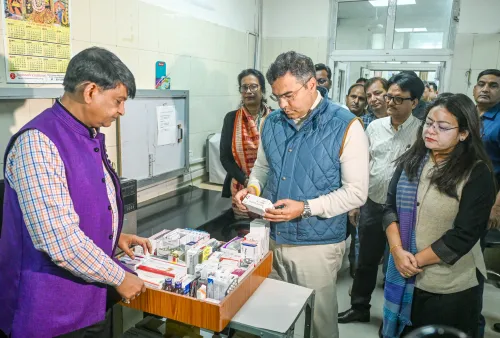Why has Tamil Nadu Declared a Red Alert in Three Districts Due to Rising Dengue Cases?

Synopsis
Key Takeaways
- Tamil Nadu has declared a red alert in Chennai, Tiruvallur, and Coimbatore.
- Over 15,000 dengue cases have been reported this year.
- The primary cause is the Aedes aegypti mosquito.
- Health officials are enhancing mosquito-control measures.
- Public cooperation is essential for effective prevention.
Chennai, Oct 8 (NationPress) The Tamil Nadu government has issued a red alert in three districts – Chennai, Tiruvallur, and Coimbatore – due to a significant increase in dengue cases over the last few weeks.
Health officials have been instructed to enhance mosquito-control strategies and bolster hospital readiness as the state faces a concerning rise in fever-related illnesses.
As per the Directorate of Public Health, Tamil Nadu has reported over 15,000 dengue cases this year, with infections accelerating recently due to unpredictable weather.
The Aedes aegypti mosquito, which thrives in stagnant water, has been pinpointed as the main factor behind the outbreak.
Chennai has seen the highest incidence, with 3,665 dengue infections confirmed among 12,264 patients seeking treatment for fever.
In Tiruvallur, there have been 1,171 dengue cases reported out of 9,367 fever cases, while Coimbatore has documented 1,278 dengue infections among 7,998 patients, according to health officials.
State Health Minister Ma. Subramanian stated that there have been eight dengue-related fatalities reported this year.
“We have directed all district health teams to accelerate preventive measures and enhance public awareness. Special mosquito eradication initiatives are currently underway, and hospitals remain on high alert,” he noted.
The minister also emphasized collaboration with local authorities to eliminate stagnant water in residential areas, inspect overhead tanks, open drains, and fumigate areas prone to mosquitoes.
They have been tasked with issuing advisories to the public, urging caution against mosquito breeding sites such as ponds, streams, and unutilized water containers.
Healthcare professionals in both public and private sectors have been instructed to monitor patients showing potential dengue symptoms closely and ensure prompt diagnosis to prevent complications.
The health department has initiated community awareness efforts to inform residents about preventive actions, including maintaining dry surroundings, disposing of unused containers, and utilizing mosquito repellents and nets.
With the northeast monsoon approaching, officials cautioned that the chances of water stagnation and mosquito breeding could escalate, highlighting the urgency of preventive measures to curb the spread. Residents are encouraged to assist health workers and report fever symptoms promptly for timely testing and treatment.










